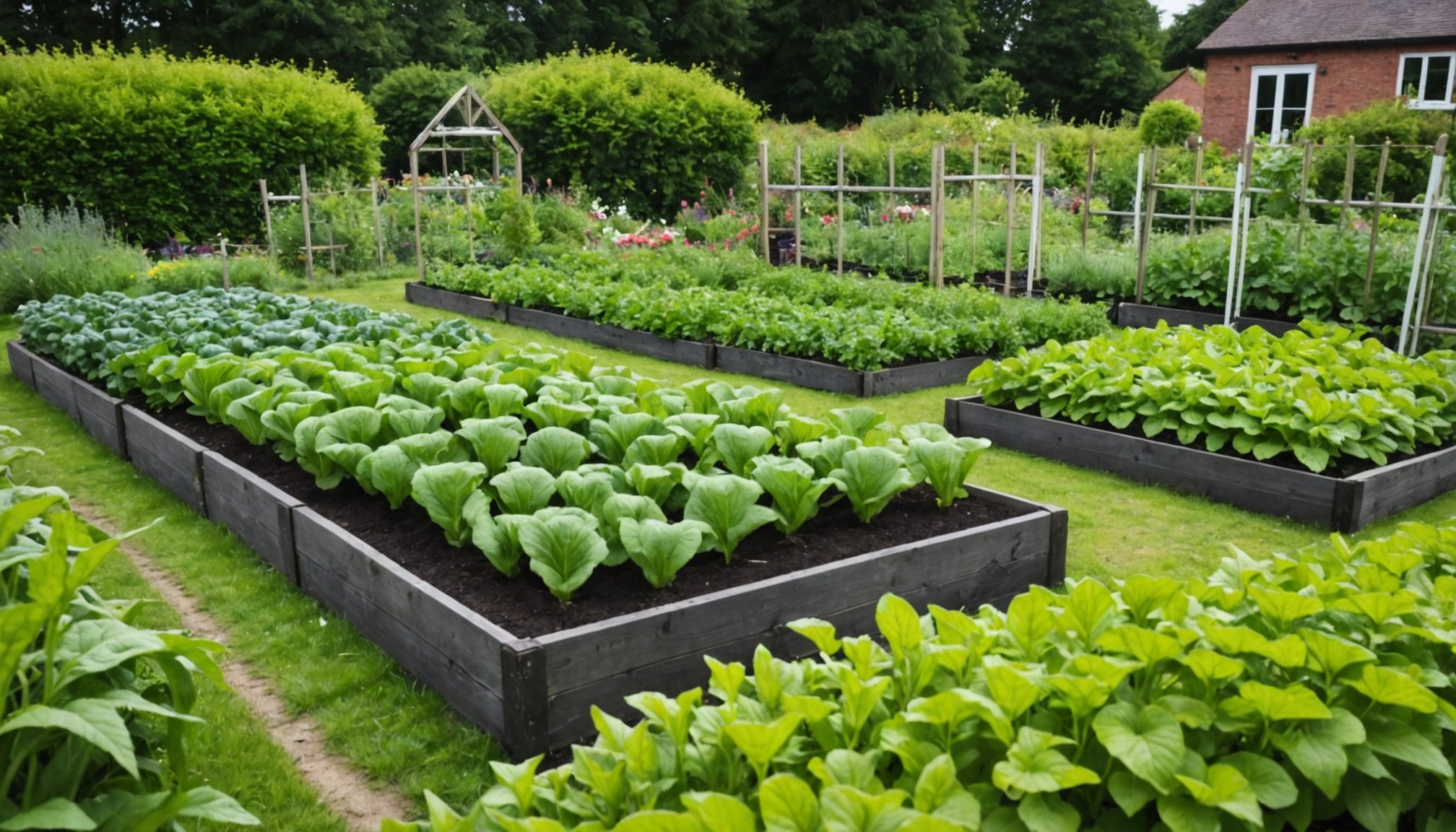Kitchen gardens offer more than just fresh produce; they provide a sanctuary for relaxation and a fulfilling way to connect with nature. For UK gardeners, cultivating a kitchen garden means embracing sustainability and reducing food miles, all while enjoying seasonal delights at your fingertips. Discover the unique benefits of tending to your own garden, including cost savings, improved health, and the sheer joy of nurturing plants. Whether you have a spacious backyard or a small patio, it’s time to explore how a kitchen garden can transform your lifestyle.
Benefits of a Kitchen Garden
Nurturing nature's bounty at home has its perks.
In the same genre : Maximizing Kitchen Space: Smart Strategies for Storing Large Cooking Utensils in UK Homes
Nutritional Benefits of Fresh Produce
Cultivating a kitchen garden provides access to fresh, organic produce. This ensures higher nutritional benefits as vitamins and minerals are preserved in freshly harvested fruits and vegetables. Home-grown food can be tailored to personal dietary needs, ensuring a balanced intake of essential nutrients.
Economic Savings Through Home-Grown Food
Growing your own food can lead to significant economic savings. The initial investment in seeds and tools is often outweighed by the reduced grocery bills. Consider this simple calculation:
This might interest you : Mastering Your Culinary Timing: A Guide to Choosing the Perfect Kitchen Timer in the UK
| Item | Store Price | Home-Grown Cost |
|---|---|---|
| Tomatoes | $3/lb | $0.5/lb |
| Lettuce | $2/head | $0.3/head |
| Herbs (basil) | $1/bunch | $0.1/bunch |
Positive Impact on Mental Health and Well-Being
Engaging in gardening activities can have a profound impact on mental health. The process of nurturing plants promotes mindfulness, reduces stress, and enhances overall well-being. The satisfaction of seeing your garden flourish contributes to a sense of accomplishment and happiness.
By embracing the advantages of gardening, one not only reaps the health benefits but also fosters an environment of sustainability and self-sufficiency.
Environmental Impact of Kitchen Gardening
Sustainable gardening practices can transform your space into an eco-friendly haven.
Reduction of Carbon Footprint
Kitchen gardening significantly reduces the carbon footprint associated with food transportation. By cultivating produce at home, you eliminate the need for long-distance shipping, which is a major contributor to greenhouse gas emissions. This shift to sustainable gardening practices helps mitigate climate change impacts.
Promoting Biodiversity in Local Ecosystems
A kitchen garden can be a sanctuary for local wildlife, promoting biodiversity. By planting a variety of species, you create a habitat that supports bees, butterflies, and beneficial insects. These creatures are crucial for pollination and maintaining healthy ecosystems. Embracing eco-friendly practices fosters a balanced environment where plants and animals thrive.
Water Conservation Techniques
Implementing water conservation techniques in your garden is both practical and environmentally conscious. Using methods like drip irrigation or rainwater harvesting can significantly reduce water usage. These eco-friendly practices not only conserve a precious resource but also lower utility costs.
- Use mulch to retain soil moisture
- Collect rainwater in barrels
- Opt for drought-resistant plants
Adopting sustainable gardening techniques not only enhances your garden's productivity but also contributes to a healthier planet. Through these actions, you become an active participant in creating a more sustainable future.
Practical Tips for Starting a Kitchen Garden in the UK
Embarking on a gardening journey can be both rewarding and challenging.
Choosing the Right Location
Selecting the ideal spot is crucial when starting a kitchen garden. Look for an area that receives ample sunlight—at least six hours daily. Proper drainage is equally important to prevent waterlogging, which can harm plant roots. Consider the proximity to a water source for easy irrigation.
Understanding Soil Quality
Soil is the foundation of any successful garden. Conduct a soil test to determine its pH and nutrient levels. Amendments like compost or well-rotted manure can enhance soil fertility, ensuring optimal growth. It's essential to tailor these amendments to suit the specific needs of your chosen plants.
Essential Tools and Equipment
Equipping yourself with the right gardening tools simplifies the process. Here’s a list of basic tools for beginners:
- Trowel for planting
- Pruning shears for trimming
- Watering can or hose
- Gloves for protection
Investing in quality tools can make gardening more enjoyable and efficient. As you gain experience, you may expand your collection to include specialized equipment. These gardening tips are designed to help beginners establish a thriving kitchen garden, fostering a sustainable and fulfilling hobby.
Best Plants for UK Kitchen Gardens
Unlock the potential of your garden with the right plant choices.
Overview of Easy-to-Grow Vegetables and Herbs
For UK gardening, selecting suitable plants is crucial. Easy-to-grow vegetables like radishes, lettuce, and carrots are ideal for beginners. Herbs such as mint, chives, and parsley thrive in the UK climate, offering versatility in cooking. These plants require minimal maintenance and adapt well to varying conditions, making them excellent choices for kitchen gardens.
Best Seasonal Planting Schedules
Understanding seasonal crops is key to maximizing your garden's yield. In the UK, spring is perfect for planting peas and spinach, while summer favors tomatoes and cucumbers. Autumn is ideal for sowing garlic and onions. Following these schedules ensures that your garden produces throughout the year, providing a continuous supply of fresh produce.
| Season | Vegetables | Herbs |
|---|---|---|
| Spring | Peas, Spinach | Chives, Parsley |
| Summer | Tomatoes, Cucumbers | Basil, Mint |
| Autumn | Garlic, Onions | Sage, Thyme |
Companion Planting for Better Yields
Companion planting enhances yields by pairing plants that benefit each other. For instance, planting carrots with onions deters pests, while basil planted near tomatoes boosts growth. This strategy not only improves productivity but also supports a healthier garden ecosystem, making it a vital practice in UK gardening.
Seasonal Considerations for UK Gardening
Adapting your gardening practices to the changing seasons is key to a thriving garden.
Spring Planting Guide
Spring marks the beginning of the gardening season in the UK, presenting an opportunity to sow a variety of crops. Consider planting early-harvest vegetables such as peas, spinach, and radishes. These crops thrive in the cooler temperatures and can be harvested early, providing fresh produce by late spring. To ensure successful growth, prepare the soil by incorporating organic matter to enhance nutrient availability.
Summer Maintenance Tips
As the UK climate warms, it's crucial to adapt your summer care practices. Regular watering is essential, especially during dry spells, to maintain soil moisture. Mulching around plants helps retain moisture and suppress weeds. Pruning is also vital to encourage healthy growth and prevent disease. Focus on monitoring pest activity, using organic solutions to control infestations without harming the environment.
Autumn Harvesting Strategies
Autumn is the time to reap the rewards of your efforts. Focus on harvesting crops like carrots, potatoes, and onions before the first frost. To prepare for winter, clear out old plants and debris, reducing disease risk. Consider planting cover crops to protect and enrich the soil over the colder months, ensuring a fertile start for the next gardening season.
Resources for Aspiring Gardeners
Embarking on a gardening journey is made easier with the right resources.
Online Forums and Local Gardening Clubs
Engaging with online forums and local gardening clubs can provide invaluable support and insights. These platforms allow you to connect with fellow enthusiasts, share experiences, and seek advice on gardening challenges. Community support is crucial for beginners, offering a sense of camaraderie and encouragement. Participating in discussions can also help you stay updated on the latest gardening trends and techniques.
Recommended Books and Websites for Further Learning
To deepen your understanding, consider exploring educational materials such as books and websites dedicated to gardening. Renowned titles like "The RHS Gardening Manual" offer comprehensive guidance on various gardening aspects. Websites such as the Royal Horticultural Society provide a wealth of information, from plant care tips to seasonal advice. These resources are essential for expanding your knowledge and honing your gardening skills.
Workshops and Courses Available in the UK
Attending workshops and courses is another effective way to enhance your gardening expertise. Many UK institutions offer classes ranging from basic gardening techniques to advanced horticulture practices. These educational opportunities provide hands-on experience and expert instruction, enabling you to apply learned skills directly to your kitchen garden. Embrace these resources to become a more confident and capable gardener.
Inspiring Kitchen Garden Success Stories
Exploring the transformative power of gardening in communities.
Profiles of Successful Kitchen Gardeners in the UK
Across the UK, gardening success stories abound, showcasing the profound impact of personal and community gardening initiatives. Take, for instance, Sarah, a London-based teacher who turned her urban balcony into a thriving kitchen garden. Her story highlights how even small spaces can yield bountiful harvests, inspiring others to explore similar ventures.
Community Gardening Initiatives and Their Impact
Community gardens have become a beacon of hope and transformation. In Manchester, the "Green Fingers" project illustrates how community gardening can foster collaboration and unity. Participants report enhanced well-being and a stronger sense of community. These initiatives not only provide fresh produce but also create lasting social bonds.
- Increased access to fresh vegetables
- Strengthened community ties
- Opportunities for intergenerational learning
How Gardening Has Transformed Lives and Communities
Gardening has the power to transform lives. Personal testimonials reveal how engaging in gardening activities has improved mental health, provided economic relief, and fostered a sense of accomplishment. Jane, a participant in a local gardening club, shares, "Gardening is my therapy. It has changed my life." These stories underscore the potential of gardening to enrich both individuals and communities.











